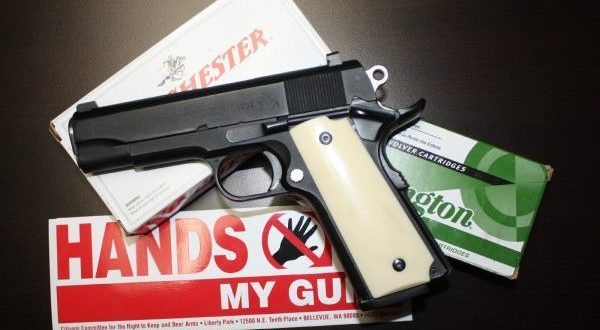
A story in Tuesday’s Seattle Times that blames “gun violence” for 75 percent of homicides in Washington State’s King County could serve as a learning tool for Second Amendment activists across the country because, while perpetuating a misconception about crime, it also undercuts one of the popular arguments of the gun prohibition lobby.
Rights activists have long criticized the dominant media for using the term “gun violence” when the crime is not the gun’s fault, but falls on the perpetrator. It’s the “guns don’t kill people, people kill people” principle.
After all, when someone is stabbed to death, nobody calls that “knife violence,” even though in any given year, according to the FBI Uniform Crime Reports, more people are fatally stabbed than are killed with rifles (including so-called “assault rifles”) or shotguns. Ditto the number of people who are bludgeoned or beaten to death. Nobody refers to “blunt instrument violence” or “fists and feet violence.”
Still, the victims are just as dead. Another headline on the Times website reports that a woman was sentenced prison for a fatal hit-and-run. Nobody called it “car violence,” and the woman was held accountable in the headline, not the vehicle.
The story is a detailed account of a bothersome situation: guns falling into the wrong hands. The suspect in a November King County murder was caught in neighboring Oregon two days after the slaying. In his possession were two stolen handguns, so it is a safe conclusion that the suspect did not go through a background check – mandated by the passage of Initiative 594 in 2014 as a solution to “gun violence” – when he acquired either gun. Call it another classic, and predictable, failure of a gun control law that seems to have been designed more for creating a registry of guns than preventing crimes, say Second Amendment advocates.
“Guns stolen in residential burglaries are increasingly making their way to the streets and into the hands of young people,” the story noted.
None of those firearms were transferred with background checks after they were stolen, and the gun owners whose property was taken are crime victims. Rights activists argue that they should not be penalized for having their lawfully-acquired property stolen.
Who other than criminals would steal anything, including firearms? Theft is one of those gun control “loopholes” that gun prohibitionists complain about.
The report also quotes veteran King County deputy prosecutor Mark Larson making this observation: “The more you associate with people with firearms, the greater your risk of either being a victim of gun violence or a perpetrator.”
That may apply to people who habitually associate with criminals, but the theory would fall apart if applied to, say, people who associate with one another at Washington Arms Collectors’ gun shows year after year, or longtime hunting buddies or shooting competitors, or the more than 100,000 King County residents who possess concealed pistol licenses.
Recently, this correspondent participated in a discussion about firearms on the Seattle Channel’s “City Inside/Out.” During that conversation, the triple slaying of teens at a party in suburban Mukilteo was mentioned. The gunman committed the crime with a rifle he had purchased a week before.
Margaret Heldring, founder of Grandmothers Against Gun Violence, stated erroneously that the shooter “didn’t have a background check, because the weapon he was able to go into a store and purchase was not required.”
That is simply not true. Liberty Park Press obtained a copy of a page in the police report filed with the Snohomish County Prosecutor’s office that affirms the killer did go through a background check. Retail firearms purchases anywhere in the country require background checks, and this case was no different. People fill out a federal Form 4473, the buyer’s name is run through the FBI’s National Instant Check System (NICS) and only after NICS okays the transaction can someone take delivery of the firearm.
Incredibly, the self-confessed gunman tried to blame his actions partly on the speedy process of purchasing the firearm. Anti-gunners think that’s terrible, but that is exactly what the NICS system was designed to accomplish, the “instant” background check. The idea was to avoid waiting periods, because they are an impairment on the right to keep and bear arms. Rights are there to be exercised immediately, while government-regulated privileges can take forever.
The arguments for waiting periods all confirm that anti-gunners suspect any gun buyer of criminal intent, and they also think owning a gun should be a privilege rather than be constitutionally protected as a fundamental right.